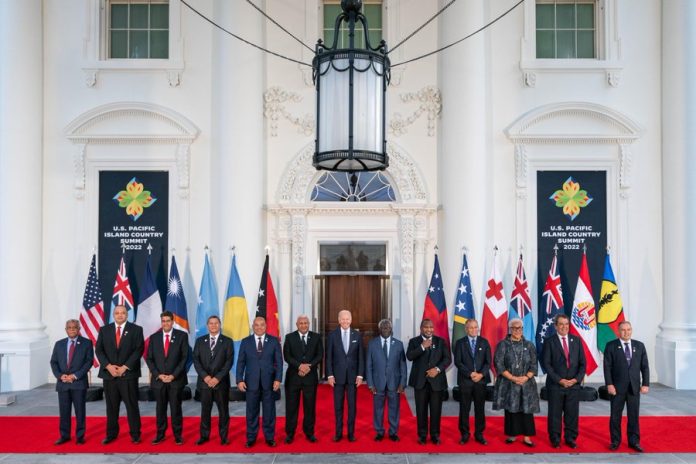The United States and Pacific leaders have reached a nine-point Declaration on U.S.-Pacific Partnership as Washington hosts its first summit with leaders from Pacific Island nations.
Thursday, U.S President Joe Biden announced more than US$810 million in expanded programme to aid the Pacific Islands as the historic summit entered its second day. The U.S has provided upward of US$1.5 billion to support the Pacific Islands over the past decade, according to a senior administration official.
The U.S also pledged to recognise the Cook Islands and Niue as sovereign states, following appropriate consultations. While both Cook Islands and Niue have full constitutional independence from New Zealand and act as independent countries, the U.S considered them as self-governing territories and has not established formal diplomatic relations.
Biden has appointed former Ambassador to Fiji Frankie Reed a first-ever U.S. envoy to the regional Pacific Islands Forum. USAID will reestablish its mission in Suva, Fiji, by September 2023.
“The security of America, quite frankly, and the world depends on your security, and the security of the Pacific Islands,” Biden said during remarks to the Pacific leaders at the State Department. Biden added that new U.S. assistance is aimed at ensuring “an Indo Pacific region that’s free and open, one that is stable and prosperous, and resilient and secure.”
Washington’s plan to deepen diplomatic engagement with the Pacific comes as concerns grow about China’s expanding influence in the region.
The White House unveiled its Pacific strategy, outlining its plan to assist the Pacific on issues such as climate change, maritime security and protecting the area from overfishing.
“The Pacific Islands are a critical voice in shaping the future, and that’s why my administration has made it a priority to strengthen our partnership with your countries,” Biden said.
“We’re seeing the consequences of climate change around the world very vividly, including in the United States right now, and I know your nations feel it acutely.”
The summit comes as China’s influence in the Pacific has grown. Earlier this year, Solomon Islands signed a controversial security pact with Beijing.
After indicating it would not adopt the declaration issued by the US and Pacific countries at the conclusion of the summit, Solomon Islands’ prime minister Manasseh Sogavare joined other Pacific countries in signing the agreement.
The U.S has been criticised for being largely absent as a partner for the Pacific in recent decades, with White House officials acknowledging that US inattentiveness toward the region since the end of the cold war has left an opening for Beijing to exert its influence.
The Pacific strategy document issued by the U.S warns of the “heightened geopolitical competition impacts” for the Pacific Island countries, making specific reference to China.
“Increasingly those impacts include pressure and economic coercion by the People’s Republic of China, which risks undermining the peace, prosperity, and security of the region, and by extension, of the United States,” the strategy document says. “These challenges demand renewed U.S engagement across the full Pacific Islands region.”
“China has been seeking to establish military relationships with some of these [Pacific Islands] countries, in at least a couple of locations,” said Chris Johnstone, a senior adviser at the Washington-based Centre for Strategic and International Studies.
Johnstone said there’s an indication the Beijing government has been pursuing actual military bases in some of these countries.
Among the new initiatives listed in the U.S-Pacific Partnership deal, the U.S will invest US$20 million to boost the Solomon Islands’ tourism and to reduce poverty in the island country.
Under the new agreement, the U.S will launch a new trade and investment dialogue with the Pacific Island nations, enhance maritime security, and provide up to US$3.5 million over five years to improve the region’s internet connectivity and to support cyber security.
Earlier this month, the Marshall Islands suspended talks with American officials about renewing the two countries’ strategic partnership, protesting what it perceives as the U.S failure to address the health and environmental impacts from U.S. nuclear testing in the region during the 1940s and 1950s.
There is no specific mention of the nuclear legacy issues in the U.S.-Pacific declaration.
“While, from a U.S perspective, ongoing negotiations on grant funding under the Compact of Free Association do not concern the nuclear issue, the Marshall Islands see the negotiations as an opportunity to press its case,” said Brian Harding, a senior expert on Southeast Asia for the U.S Institute of Peace.
The Marshall Islands, Palau and Micronesia are so-called Freely Associated States (FAS) that had signed treaties with the United States. Current agreements expire in September 2023 for the Marshall Islands and Micronesia and one year later for Palau.
Under the soon-to-expire treaties known as Compacts of Free Association, the three Pacific Island nations receive grant aid and security guarantees from the U.S government. FAS citizens can live and work in the U.S without a visa.
In exchange, the United States has the right to build military bases in these three island nations and can deny outsider access to those countries’ waters, airspace and land.
The U.S expects the negotiation for all three Compact agreements to be concluded by the end of this year.
Leaders from Fiji, the Marshall Islands, Micronesia, Palau, Papua New Guinea, Samoa, Solomon Islands, Tonga, Tuvalu, the Cook Islands, French Polynesia and New Caledonia have been in Washington for a two-day summit this week.
Vanuatu and Nauru sent representatives, and Australia, New Zealand and the secretary general of the Pacific Island Forum sent observers, according to the White House. The president hosted leaders for a dinner on Thursday evening at the White House.
SOURCE: VOA/THE GUARDIAN/PACNEWS













